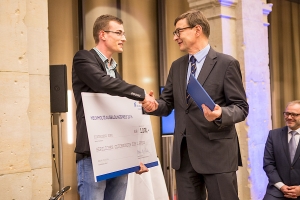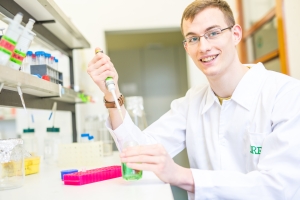Lukas Geschwender of Karlsruhe Institute of Technology (KIT) has won the 2016 Helmholtz Apprenticeship Award. For his outstanding achievements, the 21-year old biology lab assistant was granted the first place and price money in the amount of EUR 1000 by the Helmholtz Association. The awards ceremony took place yesterday evening (April 07, 2016) in Berlin. At the Molecular Cell Biology Division of the KIT Botanical Institute, Geschwender was involved in a research project and experimentally identified genetic factors that make rice more resistant to salt stress. Having completed his vocational training as a biology lab assistant, he now studies applied biology at KIT.
“Vocational training is a central priority of KIT as is the education of our students. With about 470 trainees, the KIT is among the biggest companies providing vocational training in the region,” KIT Vice President for Human Resources and Law, Dr. Elke Luise Barnstedt, says. “The Apprenticeship Award granted to Lukas Geschwender shows that trainees can play an important role in research, make decisive contributions, and, in this way, are provided with excellent training. I am very happy about this and cordially congratulate him and his trainers.”
Rice is one of the main sources of food worldwide. The plant may be exposed to salt stress when the fields are flooded with seawater, for instance. During his training, Lukas Geschwender, together with a doctoral student of KIT, conducted research at the International Rice Research Institute (IRRI) on the Philippines. Their work was aimed at making rice plants more resistant to drought and salt. In experiments, the biology lab assistant found several genetic factors enhancing resistance. The findings will help better protect cultivated rice plants against environmental impacts in the future.

Awards ceremony in Berlin: Helmholtz President Prof. Otmar Wiestler with Lukas Geschwender. (Photo: Ernst Fesseler)
Under the said project, the team of KIT isolated and analyzed rice mutants, i.e. genetically modified variations of the plant that are more tolerant to drought and soil salinization. Then, they compared their protein spectra with that of the wild type. For their research, the scientists used a method called “Smart Breeding”. Here, the seedling already shows whether crossbreeding was a success. Geschwender among others had to find the right time shortly before blossoming for the analysis of pistils and stamens. Due to this small time window, he had to adhere to a strict schedule. For the study results being of use, the researchers needed a sufficient amount of samples within a few days. Geschwender had to examine the development state of the test plants which grew with variable speed depending on air humidity or solar irradiation. As a biology lab assistant, he supported the scientists, sterilized the seeds, and made them presprout in the greenhouse. In addition, he supplied the plants with water and fertilizers. Furthermore, he conducted own research and obtained results that are now used by the whole research group.
Lukas Geschwender passed his apprenticeship to become a biology lab assistant at the Botanical Institute I headed by Professor Peter Nick from 2012 to 2015. For his excellent achievements he has already been granted the prize for the best trainee in his discipline by the Chamber of Industry and Commerce.
Portrait of Lukas Geschwender: https://www.helmholtz.de/bildung/der-reiszuechter-5481/
(in German only)
About the Helmholtz Apprenticeship Award
The Helmholtz Apprenticeship Award in the amount of EUR 1000 was granted by the Helmholtz Association for the second time in 2016. The Award honors excellent achievements reached by trainees of the 18 Helmholtz Centres during their support of scientific research. The main criterion is the extent to which the respective research center profits from the achievement of the trainee by e.g. time and/or financial savings, contributions to innovation or the positive representation of the center to the public.
In close partnership with society, KIT develops solutions for urgent challenges – from climate change, energy transition and sustainable use of natural resources to artificial intelligence, sovereignty and an aging population. As The University in the Helmholtz Association, KIT unites scientific excellence from insight to application-driven research under one roof – and is thus in a unique position to drive this transformation. As a University of Excellence, KIT offers its more than 10,000 employees and 22,800 students outstanding opportunities to shape a sustainable and resilient future. KIT – Science for Impact.

